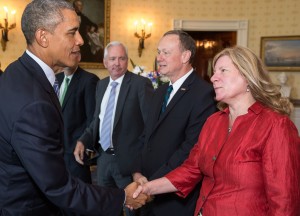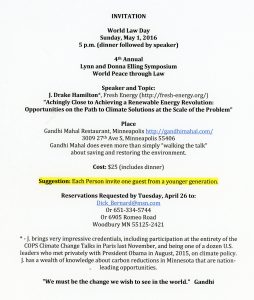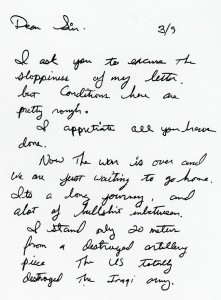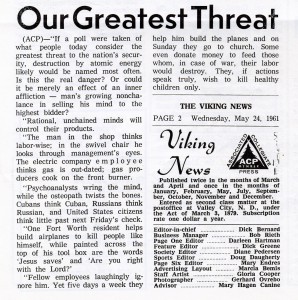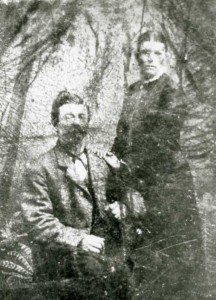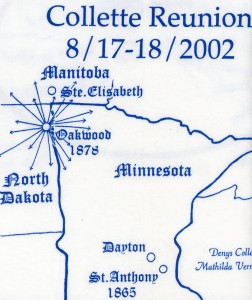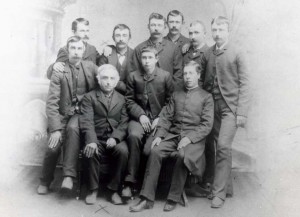(click to enlarge photos. This post includes two parts, with information from Lou Ann Matossian and Peter Balakian Updated May 9, 2016_
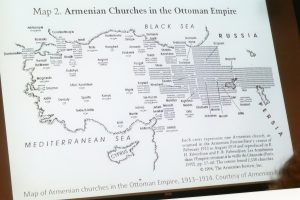
Illustration of Armenian Churches prior to the Armenian Genocide of 1915
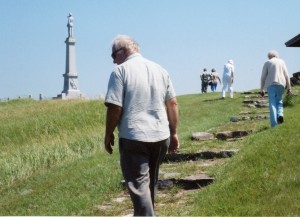
Whitestone Hill ND July, 2005
The internet brought an announcement of “A presentation and discussion led by Lou Ann Matossian on “Armenian Genocide Education and the Community.” I went to the presentation at the University of Minnesota last Wednesday evening, and learned a great deal about the delayed but active Minnesota response to the horrible Armenian Genocide perpetrated by the Ottoman Turks during a year beginning in Spring 1915.
Here are some maps relating to the Armenian Genocide from the Genocide Museum in Armenia.
(click to enlarge)
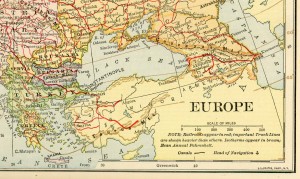
Armenia, as represented in a 1912 public school geography text found at a North Dakota farm in 2015.
Ms Matossian’s talk emphasized the relationship of the Armenians to Minnesota and the Congregational Church in particular. You can read,
here, the results of extensive research she did of Minnesota newspaper coverage of the Genocide in 1915.
I didn’t know, till Ms Matossian’s talk, of the historical Christian and Minnesota connection with Armenia.
I’ve long been aware of the genocide, but it is like numerous issues: I didn’t give it close attention…Wednesday it came to life.
When I left the gathering, I found myself thinking not only about the Armenian Genocide but other atrocities, including America’s own shameful record with people we in the olden days generically termed as “Indians”: a successful genocide at least from the standpoint of we beneficiaries, the descendants of the ancestors who got the land and won all the rights and privileges, guilt free.
Back home after the session I took out a 1912 public school geography textbook I had found on my ancestral farm in south central North Dakota. Was there anything about Armenia?
You can see parts of two maps from that book, above and below, which say a great deal. No question that there was a place called Armenia, more a question about its status, then, as a distinct state.
The wikipedia entry about Armenia
gave further help. From the article:
“Armenia became the first state in the world to adopt Christianity as its official religion. In between the late 3rd century to early years of the 4th century, the state became the first Christian nation. The official date of state adoption of Christianity is 301 AD”.
A good general reference about the Armenian Genocide may be
this one
The website of the St. Sahag Armenian Ch. in St. Paul gives some
basics of the genocide.
*
April 14, 2016, I attended a second most enlightening talk about the Armenian genocide, by Prof. Peter Balakian of Colgate University. (Subsequent to the session, I learned that Balakian
won a 2016 Pulitzer Prize.)
The photo which leads this post, of Armenian Churches existing, later destroyed, at the time of the genocide is from Balakian’s presentation.
Some comments which supplement Dr. Matossian’s:
Polish Jewish lawyer Raphael Lemkin in
Totally Unofficial defined the word genocide based on what happened in Christian Armenia, then part of the Ottoman Empire.
Hitler used societies tendency to historical amnesia about the Armenian genocide to at least partially justify what he felt was the political low risk of eliminating the Jews: “after all, who today remembers the extermination of the Armenians.”
Balakian divided genocide into two general categories: “Barbarism” is the killing of people; “Vandalism” is the destruction of an entire culture, things like differing religious beliefs, churches, art and the like.
He further differentiated between destruction of cultures in the times of territorial expansion, more or less before 1900, and what he called the “modern modality”. I could see his point; however, indiscriminate destruction of some “other” is destruction nonetheless, regardless of rationale.
I found myself thinking about the possibility that the internet in particular has created a new, equally evil, post-modern modality. In this modern day, we don’t kill people physically, we assassinate them, particularly leaders at times of elections, such as the period we are now in. This is an enhanced form of “cyber-bullying”. “Truth” in this post-modern modality is completely irrelevant. The target lives, physically, but is nonetheless the motive is to destroy the target.
I had come into Prof. Balakian’s session early, and even preceding me, in the back row, were seated two women who very much fit the appearance of Muslims. They sat there quietly. The room filled, and I heard one man, in some apparent official capacity, come past me right before the event started and say: “I think I see trouble in the back row”. (It is hardly a risk to infer that he was referring to the women I reference.)
When I left, the two women were still there. There had been no incidents of any kind. But I did notice.
There exists, I think, a great opportunity for dialogue. I wish those two women, and that man, and others, could come together, just to talk.
*
Wherever there are people, there are opportunities for genocide in the hands of evil. Rwanda and Darfur are but two examples in recent history. But we need look no further than some of the present political rhetoric of U.S. Presidential politics where deliberate ginning up of hatred for others who are somehow different is effective. We have to be constantly vigilant and outspoken within our own circles in American society. The spectre of evil is always there.
The essential conversation continues: for more about Armenian Genocide, see April 14th program announcement
here, the website of the University of Minnesota’s Center for Holocaust and Genocide Studies.
*
How bad was the Armenian Genocide?
I always try to put events in some sort of context, to try to better understand what led to/results from such events.
Of course, a post like this hardly is a pin-prick on a piece of paper about our awful history as supposedly civilized people.
“Our”, here, largely means those descended from European colonizers.
See this
data set about the bitter fruits of people against people, generally, in the last 150 years.
The 150 years between 1860 and 2010 seem to be the deadliest era in human caused death and destruction from war. The Armenian genocide comes at about mid-point in this deadly era. It is one of many tragedies.
In the case of Armenia and the Ottoman Turks, the ancient and deadly Christian Crusades to control the Holy Land may well serve as a prelude – I’ve heard it argued that the Crusades essentially “birthed” the Ottoman Turks*.
The arbitrary carving up of the Middle East as spoils to the European victors in WWI is a postlude, which very significantly contributes to the chaos in the Middle East up to the present day (ISIS and the now global “war on terror”).
Scroll down in the above referenced data set to the “1.5” in the left hand column. You’ll find reference to the
estimated 1.5 million Armenian deaths between 1915 and 1923, the “First Genocide of the 20th Century committed by the Ottoman Government on Armenian Civilians.” Scroll down a bit further, to .75 (750,000) Greek deaths in the same time period for the same reason, and .275 (275,000) Assyrian deaths in Mesopotamia (now the general area of Iraq and Syria – places like Mosul, now ISIS territory.)
And there is more perspective in the chart: scroll up to the second entry in Genocides, and there is the estimate of 55 million deaths of native people in the Americas due to conquest and colonization between 1492 and 1691. As is noted there, there are wildly disparate estimates of the actual death toll then, 8.4 to 138 million, the actual number “which might actually never be determined”.
This genocide came at the hands of my people, white Europeans, in all the assorted ways we have heard from one time to another, the history slanted towards the winners, of course.
*
About 35 miles from that south central ND farm in which I found the old geography book with the maps shown here, is the
Whitestone Hill Battlefield at which a large number of peaceful Indians on their annual buffalo hunt were massacred by American military in 1863. Twenty soldiers died; it is impossible to find a definitive number from among the several thousand Indians who were there*. The
official story is vague.
I have visited that site often (two photos above and below), and today, as always since the early 1900s, the visible monument there is to the soldiers who died, with scarce evidence of a much later, very simple unadorned stone monument to the Indians who were on their annual buffalo hunt, killed in the deadly skirmish.
I mention this fact as Ms Matossian noted that today there are no apparent monuments in Turkey to the victims of the Armenian Genocide.
Minnesota Gov. Alexander Ramsey, in 1862 officially called for either moving out or exterminating the Sioux Indians from Minnesota – a statement
repudiated by Ramsey’s successor, Gov. Mark Dayton, in 2013. It is common to dehumanize the adversary. In such situations, this scenario is common.
One of my first Minnesota relatives, Samuel Collette, was part of Henry Hastings Sibley’s Minnesota unit in the 1863 war, reaching what was to become Bismarck ND in August 1863, “mission accomplished”. Their unit wasn’t at Whitestone Hill but that was only an accident of history. Nebraska and Iowa were at Whitestone.
*
If I am correct, that 1860-2010 was a particularly gruesome “round” of people destroying other people; can I hope that the next 150 years, from 2010-2160, can be, truly, a time of awakening that we are all family, together, on an ever more fragile earth.
We all need each other.
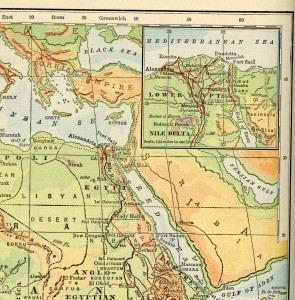
Portion of N. Africa and Middle East region, 1912 Geography Textbook

Whitestone ND Monument July 2005
* – The “elephant in the room” in much of global history is the unholy alliance of organized religion and temporal power. There is plenty of blame to go around. A winner in one round becomes the loser in another, and on we go.
** – A well researched article about the battle from the North Dakota Historical Society is “
The Battle of Whitestone Hill“, by Clair Jacobson, North Dakota History Journal of the Northern Plains, Vol 44, No. 3 Summer, 1977.
COMMENTS:
from Larry: Thanks, Dick – excellent, informative article. I particularly saved this line: The “elephant in the room” in much of global history is the unholy alliance of organized religion and temporal power. That is SO true!
from David: Nice piece. There are so many important events in history that we have, at best, a dim memory of hearing about them.
from Flo: I remember praying rosaries for the starving Armenians, and being reminded of their plight when we fussed over the food served us at home [1950s]. I don’t remember any conversations about just who the Armenians were or why they needed our prayers. Do you?
from Bill: Great article, Dick. There was a secretary at 3M that was the daughter of a survivor of the Armenian genocide. The world has never been able to get the Turks to acknowledge their role in this genocide.The USA has stopped doing so since we depend on our military bases in Turkey. I did read once that the Turks hated the Armenians for siding with Russia when Russia was attacking Turkey some years before World War I.
FOR THOSE INTERESTED.
I enjoy international topics, and often write my own impressions on international happenings.
Jan. 1, 2015, I posted a blog about the 70th anniversary of the United Nations
here.. Much to my surprise, by the end of 2015 I had posted 55 commentaries about international issues. They are all linked at the post.
International related posts at this space since Jan. 1, 2016:
1.
Jan. 22, 2016: Global Climate Issue
2.
Feb. 14, 2016: Lynn Elling, Warrior for Peace
3.
Feb. 29, 2016: The 3rd (12th) anniversary of the Haiti coup, Feb. 29, 2004.
4.
Mar. 4, 2016: Green Card Voices
5.
Mar. 6, 2016: Welcoming Refugees
6.
Mar. 12, 2016: Canada PM Justin Trudeau visits the White House
7.
Mar. 20, 2016. The 13th anniversary of the Iraq War.
8.
Mar. 22, 2016 The Two Wolves…President Obama Visits Cuba
9.
Mar. 23, 2016 The Two Wolves, Deux. Brussels



